- Home
- Cynthia Voigt
Jackaroo Page 4
Jackaroo Read online
Page 4
Burl waited beside the lantern, lit by its yellow light. He took up the soiled cloths, then held his hand out for the brush and comb.
Burl knew all the business of the Inn. He knew how to herd goats as well, but nothing of the fields or vineyards. Gwyn followed him to the storage room, carrying the lantern. She knew Burl’s value to the Inn, because she knew the Inn’s business even better than he, and she could live usefully on any one of her father’s holdings. When Tad married, his wife would take over the kitchen and closets and Gwyn would be in the way. She could go live in Old Megg’s house, then, to herd the goats and guard the vineyard. Gwyn sighed, but half in longing, to have it all behind her and the talk finished.
Chapter 4
THE CLOUDS WERE ALREADY BLOWING away as she crossed back to the kitchen. There she considered taking more logs to the guest rooms and decided to. The Inn was built of stone, and it tended to be cold in winter. Should the guests need more heat, it was the business of the Inn to provide it. She piled the logs beside the hearthstones and looked around each bedroom. The comforters were mounded high on the beds, the pillows covered now and fluffed up to look soft. The fires burned hot, and the rooms were warm enough for comfort. A jug of water stood on each table, the bowls ready beside, and beside those the cloths for drying. Gwyn pulled the doors shut behind her, resisting the temptation to open the door into the parlor and glimpse their guests.
She was thoroughly hungry, she realized, as the pangs of her stomach finally claimed her attention. Her mother kneaded bread dough at the table, but she didn’t protest when Gwyn served herself a wooden bowl of the stew from the fire, poured herself a mug of cider from the jug on the shelf, and cut a thick slice of bread.
Gwyn sat on the bench with her back to the fire, letting the heat toast her shoulders while she ate. Her mother stood across from her, working the dough with her strong hands.
The stew was hot and filling. Gwyn wolfed down several spoonfuls before her hunger became less desperate. Chunks of meat, onions and carrots, pieces of fowl, and the inevitable turnips, all flavored with thick gravy. The stew pot was kept warm at the side of the fire and her mother added into it anything left over from other meals. Sometimes the stew was dominated by the flavor of smoked meat, sometimes by the gamy taste of deer, sometimes by the acrid flavor of turnips or the bland flavorlessness of potatoes. That evening the taste of gravy dominated, which was the way Gwyn liked it best. She dipped her chunk of bread into the bowl, soaking it with gravy, then chewed off a large bite. Her mother titched at her manners, so Gwyn picked up her spoon again.
Her mother’s gray braids ringed her ears, and the lines on her face were becoming deeply dug, especially the frown lines from her nose down to the corners of her mouth. “How’s Rose?” Gwyn asked.
Her mother shrugged, turning the dough over. “She took some wine in the afternoon. She’ll live. After she marries it’ll be Wes’s problem, and once she has her first child, it’ll pass.”
Gwyn watched the hands work the dough.
“She’ll birth hard,” her mother continued, “with her first. Not you”—she looked quickly up at Gwyn—“when your time comes.”
“If I marry,” Gwyn said.
Her mother shrugged. “And what else would you do?” she asked, not expecting any answer.
Burl entered the room and served himself stew, sitting down at the far end of the table to eat. Gwyn pushed the round loaf down to him. He nodded his head but didn’t speak. He looked tired, as they all did at the end of the day. Guests at the Inn meant extra work for everyone, extra meals and extra washings, extra buckets of water hauled up from the well, extra butter to be churned and the rich food Lords were accustomed to, which was why her mother was starting bread so late. It would rise by the ashes overnight, and she would form fresh loaves in the morning, to have them ready when the guests were hungry for their morning meal.
“Where’s Da?” Gwyn asked.
“Seeing to Granda. He’s slept all day and your Da wanted to take him some wine, if he could wake him.” Granda would not live this winter through, they all knew it. He was old, and his life had been longer than most. He had left his son’s family well provided, so they did not grudge him the care he needed, nor would they weep his passing. “Guests mean payment in gold,” her mother said. “That’s something.”
“Why does anyone travel in winter?” Gwyn wondered.
“You’ll have to ask Da. I have too much to do to chatter.” Her mother always spoke short and impatient, as if talk were just another trouble among many. Her voice sounded like wind down the chimney, mournful.
Burl stood up to refill his bowl. Gwyn was content to sit still, sipping at cider and letting her body rest. It felt good to be doing nothing, for however short a time, with sleep just ahead of her. She watched Burl bend over the pot and ladle out stew. He was tall, but he seemed shorter than he was because he was thickly built. He looked even stockier than he was in heavy winter clothes: the skins wrapped up around his legs for warmth, the heavy woollen overshirt. His hair was dark, almost black, and straight; his face square with a broad forehead and broad jawbone. His beard had grown in as dark as his head, she noticed. He was a dark man, olive in his complexion and his brown eyes dark under heavy eyebrows.
She heard her father’s steps on the stairs in the barroom, and then, a few minutes later, he entered the kitchen, carrying the tray from the parlor. Da’s hair was fading into grayness, but his beard was still red, a dark red like the chestnut mare, like Gwyn’s own braids. He was a neat man, Da, and kept his beard trimmed short, his overshirt freshly washed, and his boots scraped clean. He was getting heavy, she noticed, a little more added to his girth each season. Mother still had her straight figure, was still a fine-looking woman.
Da drew himself a mug of ale and sat down facing Burl.
“They were late back,” Gwyn’s mother said. “She’s never said why.”
“Are the horses cared for?” Da asked Burl, settling first things first.
“And if the boy takes a cold, we’ll know who to blame,” Gwyn’s mother said, but then let the subject drop.
“Why are they traveling? Burl said it’s a man and his son,” Gwyn asked, then before he could speak, knowing he would take his time answering, she added, “The stallion has the King’s mark on him.”
“He’s a mapmaker,” Da told her.
“That’s what he says,” Mother added.
Da didn’t say anything, so mother went on. “More likely he’s from the King to overlook Lord Hildebrand’s revenues, or the Earl’s. Because why would anyone make a map in winter?”
“A map of what?” Gwyn asked, to distract her mother and because she was curious.
“Of the holdings and their value,” her mother snapped.
“Of the Northern Kingdom, as he told me,” Da said.
“Well, he had the box; it could hold books and ink,” Gwyn’s mother said. “But what he’ll be writing down on that paper I wouldn’t like to swear to. Not on a Lord’s say-so. And dragging a boy around with him; he can’t be more than ten or eleven.”
“You were late returning, daughter,” Da said. It was a question.
Gwyn nodded and finished her cider. “We walked an old woman home, to help her with her basket. It took us out of our way, and the Steward was late, before that.”
“You were late from the Doling Room and still took that time? In the snow? Didn’t you think of your brother? What we’ll do if he takes cold, and guests in the house—honestly Gwyn, and here I was fearing you’d met trouble on the road.”
“I’m sorry,” Gwyn said. She meant it. She didn’t like her mother to worry more than usual. But she made no more apology, and they required no more of her. They knew her. They respected her as she respected them. And she knew her own value to the Inn.
“That’s explained then,” Da said. He looked at his wife. “It may be one day you’ll be an old woman at the Doling Room and glad of a young arm to carry your basket.”
<
br /> “I wouldn’t go there, as you well know, Innkeeper, or you should.”
“Aye, I think I do,” he answered with laughter buried in his words. “So why don’t you pour me another mug of ale, and one for yourself, too, and I think we could put the cider jug on the table.” Gwyn’s mother did as he asked; the pouring and serving calmed her temper.
When they were all seated together, and the long day at its end, Burl took out his pipe and played quietly on it, music as soft as the last flakes of snow drifting down.
“The old woman was married to Hap,” Gwyn told her mother, remembering.
“It was Nell then,” her mother said, looking up with interest at the first of the news from the Doling Room. “It’s as well you helped her then, as long as Tad doesn’t take cold.”
“I don’t know how she makes that trek, she’s so old. Her husband is kept to his bed all winter—”
“I’d heard,” her mother nodded.
“They’d been robbed, when we got there.” She turned to her father with this troubling news. “Bearded men had come and taken the goat. And killed the dog, too. He couldn’t stop them.”
“He wasn’t ever a fighter, Hap,” her father said.
“It was Win who did the fighting for them,” her mother remarked. Gwyn waited to hear more of her Uncle Win, Da’s brother, who died before her parents were married. “And Hap who did the dancing for them.”
Gwyn gave them time, but they said no more. “Did you dance with him?” she asked.
“Aye, once or twice, but I was just a girl, a little younger than you are.”
“But they were so old,” Gwyn said.
For a long time the only sounds in the room were the notes from Burl’s pipe and the rumble of the logs in the fireplace.
“He was older than we were; he was Win’s age,” her mother said.
“They’ve had ill luck, more than a fair measure,” her father said.
“Can’t you play something cheerful?” Gwyn’s mother asked Burl. He nodded and switched to a melody that tumbled along, like the brooks filled with water in the spring as the snows in the mountains melted.
“They were speaking of trouble in the south,” Gwyn reported. “They didn’t know that there was another new Earl in the castle.”
“You never told them, did you?” her mother demanded.
Gwyn shook her head. “And there’s a man to be hanged, a highwayman. A young man, they said. He’ll be journeyed in the spring.”
“I don’t know why this journeying,” her mother complained. “I’ve no need to look upon the faces of the poor wretches. Nor do I know why they must wait for their hanging. We’ll send Tad to Old Megg when he comes, won’t we, husband?”
“If you like,” Da agreed.
“He won’t be pleased,” Gwyn told her mother.
Her mother snorted. “Then he’ll have to be displeased, won’t he?” When she wanted to protect Tad she could be stern enough with him. “It’s not folk like us that need to be frightened into obeying the Lords.”
“They don’t journey all those they hang,” Da said.
Gwyn thought about that, with Burl’s melody in the back of her mind. “I’d be glad of any time they’d give me, before my hanging,” she said.
“What would you know of how such a man would feel?” her mother demanded. “You let your imagination run away with you. Glad to wait, indeed. What would you know?”
“Do the women think it’s Jackaroo?” Burl asked, raising his eyes to Gwyn’s face. He spoke seldom and even more rarely did he ask a question.
“They think of it, as you’d expect,” she told him. “And I can’t blame them.”
“If it’s not your imagination that gets you into trouble it’ll be your soft heart,” her mother predicted.
But Da had been thinking along other lines. “Tad will go with you to Old Megg’s tomorrow,” he told Gwyn.
“Tad’ll spend the day inside tomorrow,” her mother answered. “He’ll not walk through the cold two days together. I’ll not have the nursing of him as well as the rest.”
“Then we’ll send Burl with you,” Da said.
“That’s not necessary,” Gwyn protested.
“I’m afraid it may be. Two are safer than one.”
“I can take care of myself.” She was insulted. He had taught her to use a staff, as well as where a knife would cripple a man, or kill him.
“Then you can protect me,” Burl said.
It would do no good to argue. For a minute she imagined herself fighting off men, while Burl cowered behind her. She heard the thud of the heavy staff as it knocked against a man’s skull and smiled at the vision of Burl’s face lit with timid gratitude as the attackers ran off over the snow. She was amused at her own imagination—should need arise, Burl would fight beside her. “Burl could soothe them with his music,” she suggested.
“I might try that first,” he answered her. “It would distract them while you made ready for the fray.” His eyes smiled at her. Burl wasn’t afraid of her sharp tongue, and he was never too proud to take her help. He never had been. Tad would do well to keep Burl on at the Inn.
“I’m to bed,” she announced. She put on her cloak and went out into the garden. Behind her, her mother’s voice reminded her to look in on Granda, to say goodnight to the old man, but not to wake him. Gwyn nodded but did not answer as she slipped out into the night.
Before she entered the privy she stood to drink in the darkness and the air fallen still after a snowfall. The clouds had all blown away. Faint moonlight silvered the fresh snow. Stars shone in a black sky, like jewels on a Lady’s cloak. The garden lay shrouded in silver white silence, all its roughness made smooth. Such snow, Gwyn thought, had a way of turning the world into what it was not and making it seem safe. Such snow masked the true face of the world.
Chapter 5
EARLY MORNING SUNLIGHT WASHED OVER the snowy hillside with light the color of new peaches. The air tasted as freshly blue as the sky. Gwyn’s head was bare in the weak sunlight. She wore a sheepskin jacket. It was enough trouble moving through deep snow in her long skirt, without adding to that the weight of a cloak.
It had been days since anybody walked the path leading from the Inn to the village. Burl stayed behind her, so she had the sense of being the first and only as she moved steadily uphill and downhill through the woods, the basket for Old Megg on one arm, her staff in the other hand—as if in the whole white world, nobody had preceded her.
Thin spires of smoke rose up from the village, which was hidden in a tiny valley. Old Megg’s hut lay a mile to the north of the village, near to Da’s vineyard. Da was lucky to have bought the vineyard. It was rare that a vineyard came up for purchase, because Lords and Innkeepers would always purchase a man’s wine so that he always had coins to pay his tithes, spring and fall. But this vineyard had been mismanaged—between poor crops and careless wine-making. Then the vineyarder had taken a chill that moved into his chest, and he died. He left no one to manage the holding, so it had come into Da’s hands, the widow acting for her young children. Da had built the goat pens near to the little house. Old Megg cared for the goats and watched over the vineyard. Thus the Inn could make its own cheeses as well as have the smoked meat of those animals they could not feed over a winter.
Their path that morning lay above the village, along the crest of a hill. Gwyn waited for Burl at the top of the rise overlooking the cluster of houses. The well, with the big iron bell hanging above it, was at the center of the village. Around the well was a flat, open space, the snow crisscrossed with many paths. Of the several houses, the Blacksmith’s was by far the grandest, made of stone, and the workshop built off one end. Those who lived in the villages were those who worked for others, as field hands, weavers, smiths, cobblers. Their holdings were small, enough land for a kitchen garden and a few fruit trees, no more. The money earned by their labor bought necessities and paid the tithes.
Gwyn’s eyes went to the north, beyond the v
illage, beyond the hills rising steep and steeper, to the mountains. On this clear morning the mountains rose up deceptively close, tall ragged peaks gilded with snow. They bit into the sky.
From the north the Kingdom was like a walled city, with the mountains preventing entrance. Travelers into the kingdom came through the broad forests to the south, along the river. Nobody knew anything of the lands beyond the mountains. They knew little of the lands to the south, and that news came only from the rare travelers, mostly merchants, who made the long journey for the Spring Fair or the Harvest Fair. The Kingdom was protected by mountains to the north and forest to the south. Gwyn had never seen the endless forests, but she had lived all of her life beneath the mountains, and she let her eyes linger over them while Burl caught up with her.
When he stood beside her, they waited a time, looking down at the village. The dark shapes of the houses stood out sharply against the snow. The bare branches of the trees showed black. Smoke curled upward. The only person visible, on this cold day in this hungry winter, stood leaning against the stones of the Blacksmith’s shop, a long, slim body wearing no protection against the weather. Gwyn stared down at him, wondering if he was, as it seemed to her, staring up at the two figures on the hill. Burl took his pipe out of his belt and started to play. The ribbon of melody slid down the hillside, then floated up into the sky. The figure raised its hand and then, looking tiny from the hilltop, went inside. Another figure came out from the shop, bigger than the first, pulling on a cloak and hurrying, with a wave of the hand over the head, to meet their path above the village. The original figure returned, to watch them, Gwyn was almost sure, just as she was almost sure she could see sunlight glinting off of the silky hair that turned gold during the summer but changed to the color of dried grass during the long winter months.
“Is that Cam, do you think?” she asked Burl, just to say the name. He finished out the line of melody and put his pipe away. Gwyn moved on now, as the figure from the village clambered up the slope ahead. “Wes’ll think it’s Rose.”

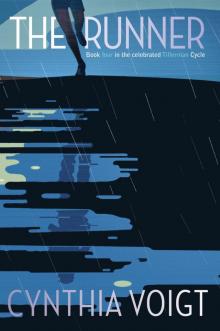 The Runner
The Runner By Any Name
By Any Name Bad Girls, Bad Girls, Whatcha Gonna Do?
Bad Girls, Bad Girls, Whatcha Gonna Do?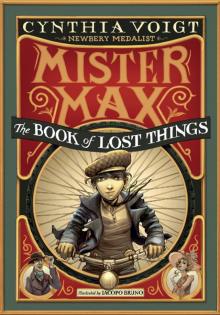 Mister Max: The Book of Lost Things: Mister Max 1
Mister Max: The Book of Lost Things: Mister Max 1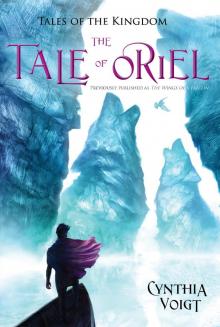 The Wings of a Falcon
The Wings of a Falcon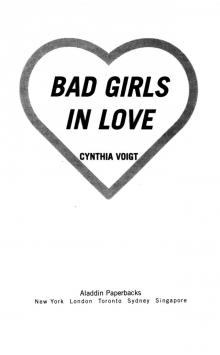 Bad Girls in Love
Bad Girls in Love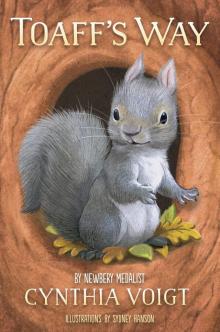 Toaff's Way
Toaff's Way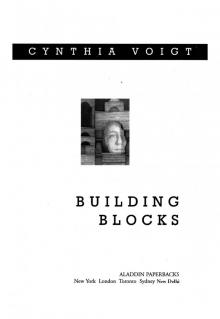 Building Blocks
Building Blocks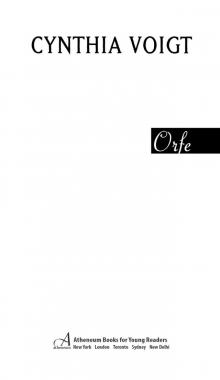 Orfe
Orfe Tell Me if the Lovers Are Losers
Tell Me if the Lovers Are Losers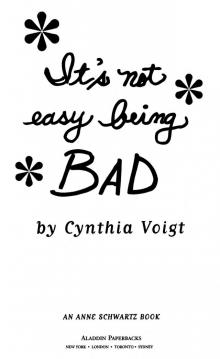 It's Not Easy Being Bad
It's Not Easy Being Bad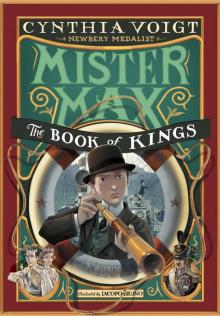 The Book of Kings
The Book of Kings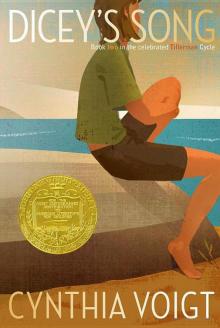 Dicey's Song
Dicey's Song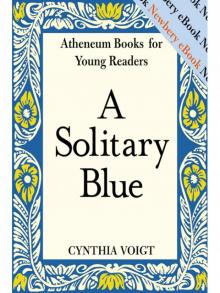 A Solitary Blue
A Solitary Blue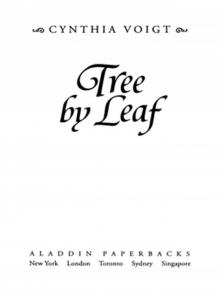 Tree by Leaf
Tree by Leaf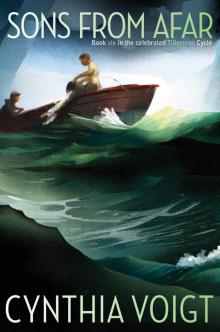 Sons From Afar
Sons From Afar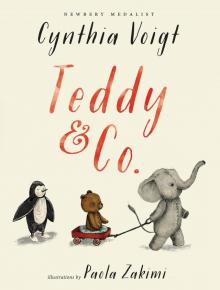 Teddy & Co.
Teddy & Co. Jackaroo
Jackaroo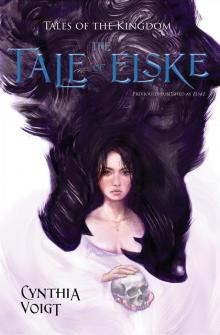 Elske
Elske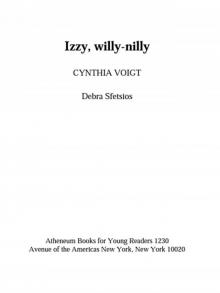 Izzy, Willy-Nilly
Izzy, Willy-Nilly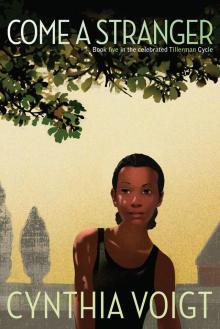 Come a Stranger
Come a Stranger Mister Max: The Book of Secrets: Mister Max 2
Mister Max: The Book of Secrets: Mister Max 2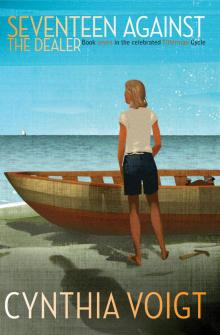 Seventeen Against the Dealer
Seventeen Against the Dealer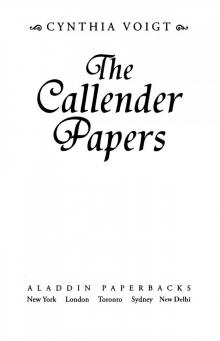 The Callender Papers
The Callender Papers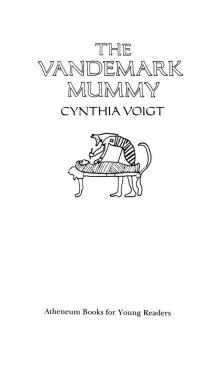 The Vandemark Mummy
The Vandemark Mummy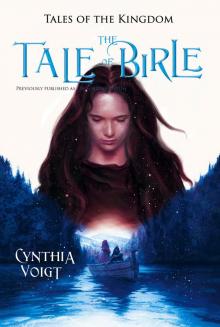 Tale of Birle
Tale of Birle Glass Mountain
Glass Mountain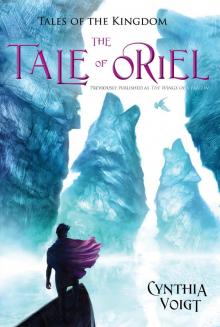 The Tale of Oriel
The Tale of Oriel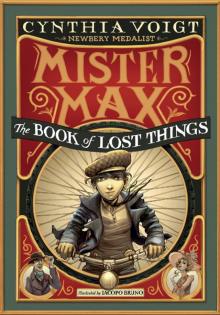 The Book of Lost Things
The Book of Lost Things The Book of Secrets
The Book of Secrets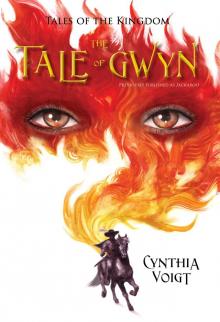 Tale of Gwyn
Tale of Gwyn